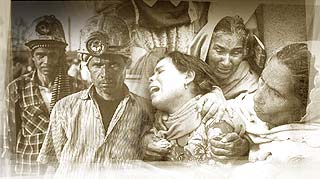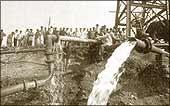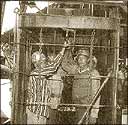The Rediff Special/ Rifat Jawaid

 As one enters the township of Dhanbad, the first thing that catches one's eye is the statue of the unknown miner in the small park outside the railway station. It symbolises, say locals, Dhanbad's identity as a coal mine town. Ironically, though, the miners themselves live in abject penury and face constant hardships. From health care to education, from availability of drinking water to living conditions, none of their conditions, as a single visit to their shanties will indicate, are satisfactory.
As one enters the township of Dhanbad, the first thing that catches one's eye is the statue of the unknown miner in the small park outside the railway station. It symbolises, say locals, Dhanbad's identity as a coal mine town. Ironically, though, the miners themselves live in abject penury and face constant hardships. From health care to education, from availability of drinking water to living conditions, none of their conditions, as a single visit to their shanties will indicate, are satisfactory.
Take Jagannath Das, born into a family of miners. "I must surely have committed some dreadful sin in my previous birth; that is why God decided I would be born in a miner's family." This is the level of pessimism among the miners, many of whom have inherited this profession from their forerfathers.
 Jagannath, who works as a loader, says working conditions in the mines are miserable. "There is no ventilation. The exhaust fans never function; as a result, except for the light of our cap lamps, we work in darkness. During the summer, the heat becomes simply unbearable; the only way for us to cool off is to pour the dirty water in the mines on ourselves. Loaders have to lift two tonnes of coals each during our eight-hour long shift. This is not an uphill task in winter but, in summer, it is sheer torture. Then, filling even one tub seems an impossible task. But we have no choice; if we don't meet the target, our wages are cut."
Jagannath, who works as a loader, says working conditions in the mines are miserable. "There is no ventilation. The exhaust fans never function; as a result, except for the light of our cap lamps, we work in darkness. During the summer, the heat becomes simply unbearable; the only way for us to cool off is to pour the dirty water in the mines on ourselves. Loaders have to lift two tonnes of coals each during our eight-hour long shift. This is not an uphill task in winter but, in summer, it is sheer torture. Then, filling even one tub seems an impossible task. But we have no choice; if we don't meet the target, our wages are cut."
A graduate in arts from the Dumka district in newly formed Jharkhand, Jagannath says the severe crisis in job market compelled him, and many others, to take up jobs as miners. His mother, Kajli Mochi, worked in the Bagdigi colliery for over two decades. Then, in 1996, she discovered she had contracted tuberculosis due to constant exposure to coal dust. She left the job and her son was employed in her place.
Winter only aggravates her heath problems. “Every time we enter the chanak (mine), we know that death is not far away. We pray to God asking Him to bring us out safely. But we still go in, because we have to make both ends meet. Tell me, if we don’t work in mines, how will we survive? Where are the alternative jobs?” asks Kajli, even as she admits that, as a woman, it was even more difficult to work in the mines.
The Bagdigi tragedy has frightened Jagannath's wife, Nirmala, tremendously. Ever since the death of the 29 miners, she has been picking fights with her husband, hoping to stop him from going back to the mines. "Swami (it is how she addresses her husband) says he doesn’t really have any options. But a loader's job is the most dangerous. My worries have increased after the Bagdigi incident. My heart remains in my mouth until he returns home. Thankfully, he was on night shift, otherwise he too would have been trapped. The fact that I have prayed to Maa Manasa all these years saved him."
Accidents like the Bagdigi tragedy have strengthened the women's belief in God. As soon as the men leave for the mines, the women hold a mass puja, praying for safe return of their husbands. They also fast once a week, besides going for Mahabir Bipartaran (a weekly ritual that is said to keep the evil spirits at bay).
The Bagdigi tragedy has had yet another effect. Jagannath's children -- Jagdish, Suraj, Prinyanka and Renuka -- are none too happy with their father's profession. Jagdish -- like many other youngsters -- had decided he does not want to be a miner; he is now concentrating on becoming a teacher. However, Jagdish and others like him can only realise their dreams when good schools come up in the area. There is just one Bharat Coking Coal Limited-run school in Bagdigi where, say the villagers, the teachers never turn up. Jagdish, meanwhile, says he has no aspirations to become an engineer or a doctor. "My family can’t bear the expense that such studies will incur,” he says matter-of-factly.
A miner here earns around Rs 4,500 a month. This may seem paltry by urban standards but, in this belt of rural India, it is a huge sum. But the miners say that, keeping the hazardous nature of their work in mind, they are not paid adequately. They point out that they have to buy coal since it is the only source of fuel in the region. “Earlier, we used to get five kgs of coals every month. Now, we don't get anything. We mine coal for the world, but we can't use it until we buy some," laments 56-year-old Chokal.
 Jagannath's co-worker, Basant, complains that senior officers get their salary on time but the underground workers are never paid before the end of the month. "Sometimes, we don't get paid for months. Then, when we approach our officers, we are threatened with suspension, wage cuts and dismissal. People think we can live a lavish life with what we earn, but they don't realise that we have to purchase everything -- including drinking water -- ourselves. The Bagdigi colliery residential area, which has a population of about 5,000 people, has only one water pump which never works. So we have no option but to purchase drinking water for Rs 10 a gallon. And, in summer, most of our salary is used to purchase water. In fact, if you visit us in summer, we would not offer you a drop of drinking water even if you are dying of thirst."
Jagannath's co-worker, Basant, complains that senior officers get their salary on time but the underground workers are never paid before the end of the month. "Sometimes, we don't get paid for months. Then, when we approach our officers, we are threatened with suspension, wage cuts and dismissal. People think we can live a lavish life with what we earn, but they don't realise that we have to purchase everything -- including drinking water -- ourselves. The Bagdigi colliery residential area, which has a population of about 5,000 people, has only one water pump which never works. So we have no option but to purchase drinking water for Rs 10 a gallon. And, in summer, most of our salary is used to purchase water. In fact, if you visit us in summer, we would not offer you a drop of drinking water even if you are dying of thirst."
That may be an exaggeration, but the fact remains that the lone primary health centre at Bagidgi has no water. In fact, the heath centre has not been of much use to the miners. Alarmed by the rising number of TB patients in their midst, over a hundred miners in Bagdigi have opted for the Voluntary Retirement Scheme.
"Eighty per cent of the miners here have TB. But the best treatment is only available at the BCCL’s central hospital in Dhanbad, which is about 30 km away. The nearest place where we can get a vehicle is eight kilometres away. Besides, we can’t get treatment the Central Hospital, unless we have a reference from the doctor at Bagdigi, who does so only after we bribe him,” says Chokal, who suffers from TB.
The BCCL refused to answer these charges. Newly appointed CMD, B N Pan, said he had been instructed not to speak to the media by the minister. His subordinate is reluctant to admit that rampant corruption in the BCCL has worsened the plight of miners. A BCCL executive director, K N Singh, dismissed every allegation as baseless. "Yeh sab bakwas hai, aisa kuch bhi nahi hai (These allegations are rubbish. There is nothing of the sort)."
Design: Dominic Xavier
ALSO SEE
Mine disaster near Nagpur: 6 trapped
The Dhanbad mine tragedy
The Rediff Specials